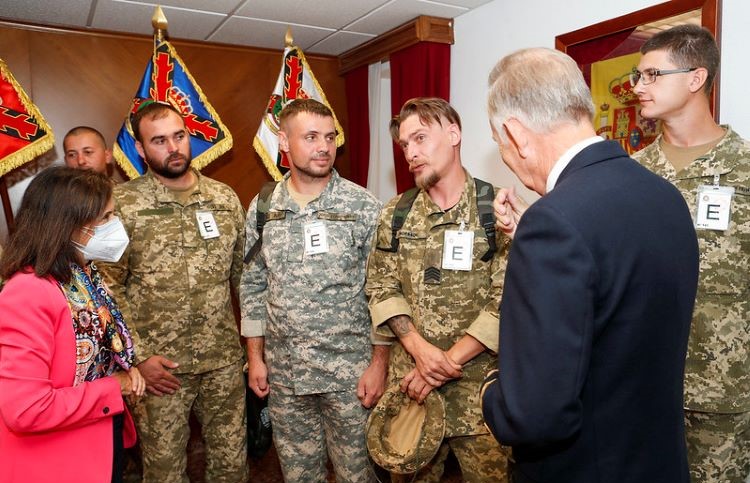The Diplomat
The Minister of Defense, Margarita Robles, visited yesterday the Air Deployment Support Squadron (EADA) at the Zaragoza Air Base, where 19 Ukrainian military personnel are receiving training as part of the Ministry of Defense’s sustained support commitment to Ukraine.
The Ukrainian servicemen, under the command of a commander, are being instructed by EADA personnel on the use of anti-aircraft systems, which will enable them to operate autonomously in the area of operations. The training has been divided into two parts, one for system operators and the other for maintenance personnel (armorers, mechanics and electronics), the Ministry said in a press release.
“Beyond the training you are learning here, I wanted to convey to you the support, affection and recognition of the whole of Spain with Ukraine. Your stay here for us is a way to show you our recognition and our admiration. All the Ukrainian people and you have shown that you are brave and heroic,” Robles said.
“Spain feels very close and very close to Ukraine, and we are going to support you until Ukraine wins this war completely. We are very pleased to be able to help them. Ukraine is setting an example to the world, it is an example for all citizens and also for the Spanish military,” the minister added. Robles also had a meeting with the Ukrainian military, with whom she talked about their personal situation and about their experience in our country.
This military training assistance mission is part of the European Union’s support measures for Ukraine in the war it has been waging against Russia for more than seven months, which were discussed at the meeting of the bloc’s defense ministers organized in Prague last August. The mission, which was initially scheduled to last three weeks but will be extended by one more, will end on October 14, according to the head of the EADA, Air and Space Army Colonel Carlos Forcano. More Ukrainian military personnel are scheduled to arrive in Spain on November 1.
The Aspide system in which the Ukrainian military is being trained, currently in use in the Air Force, will provide the Ukrainian Army with operational capability, as well as acting as a deterrent. “The main goal is not for them to become experts in the material, but to be able to operate it,” the EADA chief explained.
In general terms, the EADA’s mission is to support the defense, deployment and maintenance of the operating conditions of the Air Force’s air and space units wherever they are deployed. It is a highly specialized and versatile unit, which is part of the NATO Response Forces. Likewise, the unit carries out numerous exercises and operations both at international level and with other allied forces, within the framework of the different international organizations of which Spain is a member, such as the UN, the EU or the Atlantic Alliance.
For his part, the commander in command of the Ukrainian troops, Dimitri Shelekhov, thanked the Minister and the instructors for their support and collaboration with Ukraine, as well as for sending material and the medical care received by his compatriots at the Defense Hospital in Zaragoza. “They have worked very hard and we are very grateful to them,” said the commander. “Every day Ukrainian cities are hit with missiles. Many civilian people die. Many children and many soldiers are killed and wounded. Thank you very much for everything you do for Ukraine. We know that Spain is our ally and Europe too, and we thank you very much,” he added.
Last Thursday, a land convoy for the transport of eight light vehicles, two ambulances and five tons of medical material left Alcalá de Henares (Madrid) for Poland. To date, Spain’s aid effort to Ukraine has consisted of some 31 aircraft, transporting material and personnel, including the wounded and children, nearly 80 trucks and two ships.







